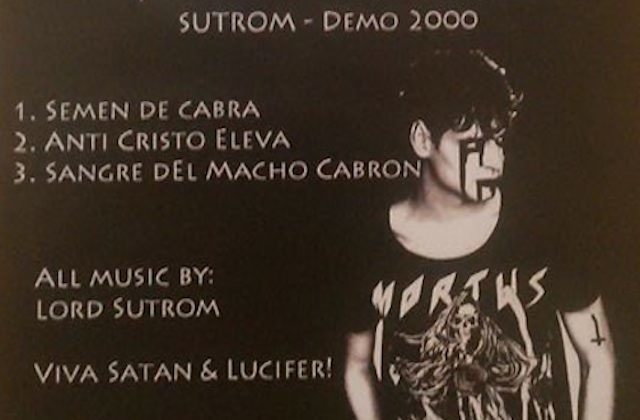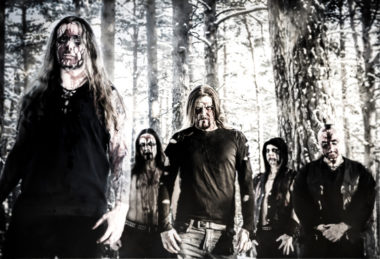SOURCE
Padot
ovat viimein auenneet, ja Moonsorrow purjehtii taivaanrantaan
kevyemmässä lastissa. Jumalten ajasta ihmisen aikaan on pitkä matka.
Folkmetalli
on ruma sana. Kun Moonsorrow’n basisti-laulaja Ville Sorvali ja
kitaristi Mitja Harvilahti puhuvat yhtyettään inspiroivasta musiikista,
he puhuvat mieluiten kansanmusiikkivaikutteista. Ihan nolojen
väärinkäsitysten välttämiseksi.
– Folkmetallista on tullut jotenkin niin perverssiä, Sorvali sanoo. – Koko juttu on käsitetty täysin väärin.
–
Folk metal on pahinta mahdollista kuraa sekä ulkomusiikillisesti että
musiikillisesti, Harvilahti jatkaa. – Se on eskapistista, teutonista
hilipatihippanmeininkiä ja larppausta. Vaatteet, kaljanjuominen ja
sarvienkalistelu ovat jättäneet musiikin varjoonsa.
Sorvali lisää, että kaiken lisäksi folk metal -leima lyödään usein ihan vääriin bändeihin.
–
Me ollaan bändien kesken nimetty huviksemme ”folkmetallin Big 5”,
Sorvali sanoo. – Siihen kuuluvat Moonsorrow, Turisas, Ensiferum,
Korpiklaani ja Finntroll. Näistä viidestä yhtyeestä folkmetallia edustaa
Korpiklaani. Ei mikään muu.
Asia selvä. Moonsorrow ei soita folkmetallia. Moonsorrow soittaa pakanametallia. Piste.
On
ymmärrettävää, että Moonsorrow haluaa irti mainitusta genrestä. Alan
bändien määrä on lisääntynyt räjähdysmäisesti, ja sen myötä skenestä on
tullut kliseinen ja korni. Liian usein yhtyeen imago on näyttävä, mutta
rintapanssareiden ja kilpien takaa ei löydy mitään.
Siitä
huolimatta sana ”folk” viittaa kansanperinteisiin, ja ne ovat tärkeitä
myös Moonsorrow’lle, jonka muinaisajan mausteilla ryyditetty musiikki
kiinnostaa varsin suurta ihmisjoukkoa ympäri maailman. Kansanperinteissä
ei ole mitään kirottavaa.
– Hyviäkin folk metal -bändejä on,
Harvilahti sanoo. – Ne tekevät todella monipuolista musiikkia. Harva
genre pystyy yhdistelemään yhtä monia eri elementtejä. Sanoituksissa on
historiaa ja fantasiaa, musiikissa metallia ja kansanmusiikkia. Kaikki
tuo on nivottu yhteen houkuttelevaksi kokonaisuudeksi.
Sorvali
toteaa, että puhuttiinpa sitten folkmetallista, viikinkimetallista
(josta Moonsorrow haluaa myös sanoutua irti) tai pakanametallista,
musiikin kulttuurinen aspekti on erittäin tärkeä.
– Ihmisiä
kiinnostaa sellaisessa musiikissa se, että bändit menevät ajassa
taaksepäin ja laulavat enemmän tai vähemmän todellisista
historiallisista tapahtumista. Se nostaa esiin tuntemuksia, joita
ihmiset ovat kokeneet jo kauan ennen sähkökitaran keksimistä.
Vaiheikas kaari
Moonsorrow
alkaa olla siinä iässä, että sen uralle voi merkitä historiallisia
tapahtumia. Ensimmäinen on hetki, kun Ville ja Henri Sorvali perustivat
Moonsorrow’n vuonna 1995. Kahden serkuksen projektina käynnistynyt bändi
teki ensimmäiset demonsa 90-luvun lopulla.
Muutaman ensimmäisen
vuoden aikana Moonsorrow’sta kasvoi bändi. Rumpali Marko Tarvonen
liittyi Sorvalien seuraan ennen debyyttialbumi Suden unen äänityksiä
(2000). Mitja Harvilahti puolestaan ehti mukaan Voimasta ja kunniasta
-albumille (2001), joka oli Moonsorrow’n toinen pitkäsoitto ja
ensimmäinen levytys Spinefarmille. Kosketinsoittaja Markus Eurén liittyi
bändiin samaan aikaan Harvilahden kanssa. Kolmas albumi Kivenkantaja
ilmestyi 2003.
Nykyinen miehitys saatiin kokoon, kun Henri Sorvali
kyllästyi keikkailuun ja jättäytyi pois kiertueilta Moonsorrow’n
luovaksi harmaaksi eminenssiksi, säveltäjäksi ja tuottajaksi. Hänen
tilalleen keikkakitaristiksi liittyi Janne Perttilä.
Seuraavaksi
ilmestyivät ”pitkäsoiton” käsitteen uudelleen määritellyt albumi
Verisäkeet (2005), V: Hävitetty (2007) ja albuminmittainen ep-levy
Tulimyrsky (2008).
Helmikuussa 2011 julkaistu Varjoina kuljemme
kuolleiden maassa jäi Moonsorrow’n viimeiseksi Spinefarmille tehdyksi
levyksi. Seuraavana vuonna yhtye ilmoitti tehneensä diilin Century Media
Recordsin kanssa. Jämerä välitilinpäätös oli neljätoista vinyylilevyä
sisältänyt Heritage: 1995–2008 – The Collected Works -boksi, jonka Blood
Music julkaisi vuonna 2014.
Seuraava Moonsorrow-albumi
julkaistaan vasta neljä vuotta Century Median kanssa tehdyn
levytyssopimuksen jälkeen. Jumalten aika ilmestyy aprillipäivänä 2016.
Tässä
vaiheessa Moonsorrow on siirtynyt uudelle vuosikymmenelle. Bändi vietti
viime vuonna 20-vuotisjuhlaansa. Tai jos tarkkoja ollaan, ei viettänyt.
–
Me ei muistettu juhlia, Harvilahti sanoo. – Kyllä se ajatus hiukan
kutkutteli takaraivossa, mutta juhlat jäivät järjestämättä. Aika menee
niin nopeasti. Varsinkin viimeiset kahdeksan vuotta on mennyt ihan
vilauksessa.
Sorvali naurahtaa, että aina välillä mieleen iskeytyy
sellainen järisyttävä fakta, että Moonsorrow’n jäsenenä on tullut oltua
reippaasti yli puolet elämästä.
– Vaikka se on pitkä aika, pystyn
kyllä hahmottamaan bändin tähänastisen kaaren. Odotuksiin nähden se on
ollut äärettömän tapahtumarikas matka.
Sorvali jatkaa, että pitkälle tiellä on kohdattu monia yllätyksiä, ja ne ovat olleet voittopuolisesti positiivisia.
–
Ekalla lennolla Meksikoon me naureskeltiin, että eipä tullut aikoinaan
demoja tehdessä mieleen, että soitetaan vielä joskus Meksikossa ja
vieläpä suomenkielistä musaa. Tässä on saanut tehdä kaikenlaisia
Kiinan-reissuja. Kaikesta sellaisesta voi olla vain yllättynyt ja
kiitollinen.
”Karttanörtiksi” tunnustautuva Sorvali kertoo
laatineensa listan maista, joissa on käynyt. Niitä on kaikkiaan 42, ja
yli kolmessakymmenessä on vierailtu Moonsorrow’n kanssa.
–
Rundeilla saattaa joskus nähdä jotain paikkojakin, Harvilahti
huomauttaa. – Minulla kääntyy kiertueilla rytmi sellaiseksi, että menen
heti keikan jälkeen nukkumaan ja herään kahdeksalta aamulla. Silloin jää
aikaa katsella ympärilleen. Se reissu, joka me tehtiin Finntrollin
kanssa Jenkeissä, oli mulle kuin lomamatka.
– Toisaalta
Australiassa mentiin aina suoraan keikalta hotelliin, ja lento lähti
heti seuraavana aamuna. Ja jos multa kysytään, Saksassa ei ole mitään
muuta kuin lentokenttiä, moottoriteitä ja huoltoasemia, joista Ville
ostaa BiFiä. Sitten siellä on festareita ja huonoja hotelleja. Siinä
kaikki, mitä olen nähnyt Saksassa viimeksi kuluneen kymmenen vuoden
aikana.
– BiFi on teollisesti survottu ja kasaan sullottu saksalainen epämakkara, Sorvali täsmentää.
Epämakkara on ihmisen ajan ruokaa, Moonsorrow jumalten ajan musiikkia.
Primitiivinen tunnelma
Varjoina
kuljemme kuolleiden maassa -levyn ja Jumalten ajan välissä kului
yllättävän paljon aikaa. Ville Sorvali kertoo, että Jumalten ajan
säveltäminen aloitettiin jo 2012, heti edellisen levyn ilmestymistä
seuranneena vuonna. Se oli kuitenkin varaslähtö. Kappaleita kyllä
syntyi, mutta aikansa tahkottuaan Moonsorrow joutui myöntämään, ettei
niistä tullut sellaisia kuin piti.
– Se oli sellaista tylsää ja
menevää musiikkia, Harvilahti muistelee. – Siinä ei ollut sitä
tarttumapintaa eikä syvyyttä, jota me kaivattiin.
Moonsorrow kaipasi jonkinlaista muutosta, mutta ei tiennyt, mihin suuntaan olisi pitänyt lähteä.
–
Tietoisesti me ei yritetty tehdä mitään tietynlaista, Sorvali sanoo. –
Taisi kuitenkin käydä niin, että bändi alkoi alitajuisesti tehdä
uudelleen toista tai kolmatta levyään. Eihän sellainen oikein skulannut,
kun niistä oli kulunut aikaa jo kymmenen vuotta.
Selitys pitkälle
julkaisuvälille löytyy matkan tästä mutkasta. Kun toimimaton tavara oli
hävitetty, uuteen alkuun ei päästykään ihan noin vain.
– Koskaan
ennen ei ole ollut sellaista tilannetta, Harvilahti kertoo. – Me
jahkattiin ja jahkattiin, mutta asiat eivät menneet eteenpäin.
Äänitettiin jotain, mutta seuraavana päivänä se oli kadonnut tai
muuttanut muotoaan.
– Siinä oli tosiaan pitkä blokki. Mutta kun se
lopulta aukesi, musaa alkoi tulla aika sujuvasti. Siis meidän
mittapuulla, Sorvali sanoo. – Sovitusvaihtoehtoja oli tietenkin aivan
helvetisti, ja mehän mennään studioon aina valmiin matskun kanssa. No,
Henu sai tuskailla kappaleet lopulliseen muotoonsa.
”Henu” on
Moonsorrow’n primus motor Henri Sorvali. Hän sanoo uuden albumin
tiedotteessa, että Jumalten ajalla on enemmän kansanmusiikkivaikutteita
kuin edellisillä levyillä ja ne ovat integroituneet lujemmin kiinni
yleissoundiin.
Ville
Sorvali kertoo, että folkelementit nousivat pintaan siinä vaiheessa,
kun kuvainnollinen pöytä puhdistettiin käyttökelvottomista kappaleista.
–
Me tajuttiin, että juuri kansanmusiikkivaikutteet tekevät tästä
bändistä Moonsorrow’n. Ja nyt ei puhuta mistään folk metal -vaikutteista
vaan kunnon kansanmusiikista kaikkine jouhikoineen ja jodlauksineen.
”Kunnon
kansanmusiikki” on juuri se elementti, jolla Moonsorrow haluaa erottua
toisiaan apinoivista muinaismetalliyhtyeistä. Se ottaa mieluummin mallia
1900-luvun alussa tehdyistä perinnemusiikkiäänitteistä.
Autenttista
vaikutelmaa tavoiteltiin vierailevien muusikoiden avulla. Korpiklaanin
Jonne Järvelä laulaa levyllä samaanityyliin, ja hänen bändissään ennen
vaikuttanut Hittavainen soittaa perinteisiä jousi- ja puhallinsoittimia.
Traditionaalisen karjankutsulaulun luikauttaa Helena Haaparanta.
–
Ne jutut toivat kokonaissoundiin paljon lisää, Sorvali sanoo. – Levyllä
on alkukantainen tunnelma, ja se sopii Moonsorrow’lle. Jumalten aika ei
ole mikään tyhmä heavy metal -levy.
Uusilla raiteilla
Ensimmäinen
vaikutelma Jumalten aika -albumista on, että kaikki ei ole ihan niin
kuin ennen. Levyn kappaleet ovat helpommin hahmotettavissa kuin
edellisten levyjen materiaali.
Muutos on hienovarainen mutta
selkeä – jopa niin selkeä, että Sorvali ja Harvilahti suostuvat
myöntämään, että Jumalten aika koostuu ”biiseistä”, niin banaalilta kuin
tuo sana näin eeppisessä asiayhteydessä kuulostaakin.
Harvilahti
sanoo, että lähtökohtana oli entistä riffivetoisempien kappaleiden
kirjoittaminen. Se tuntui hyvältä vastapainolta edellisen levyn
kitaravalleille ja maalailulle.
Vaikka musiikin ääriviivat ovat
selkeämmät, se on yhä massiivista ja mittavaa. Jumalten aika ei
kuitenkaan katkaise kehitystä, joka alkoi Verisäkeiden aikaan.
–
Verisäkeet-levyä tehdessä me oltiin saatu Henun kanssa valmiiksi pari
kymmenminuuttista biisiä, Sorvali muistelee. – Alettiin sitten heittää
läppää, että pitäisikö tehdä levy, jonka kaikki biisit ovat näin pitkiä.
Se oli vitsi, mutta siitä se lähti. Hävitetyllä olikin sitten
puolituntisia biisejä. Sitä on vaikea selittää. Ne vain syntyvät.
Jumalten
ajan Suden tunti on Moonsorrow’n ensimmäinen alle kymmenminuuttinen
kappale vuosiin, mutta bändi ei edelleenkään tavoittele säveltäessään
radiosoiton ihannemittaa. Ja jos tavoittelisi, tuskin onnistuisi. Eikä
ainakaan soisi radiossa.
– Kun on kerran hiffannut, miten
tällaista musiikkia tehdään, siitä on vaikeaa palata takaisin rockbiisin
peruskaavaan, Harvilahti sanoo. – Musiikista tulee ikään kun juna, joka
kulkee eteenpäin. Se tekee omista rakenteistaan eeppisiä.
Vaikka
junamatka on turhan moderni allegoria Moonsorrow’n kaltaisen yhtyeen
uralle, Ville Sorvali ilahtuu rinnastuksesta. Hän ohjaa sen raiteelle,
joka vie aina Jumalten ajan asemalle asti.
– Edellisillä levyillä
musiikki oli kuin tavarajuna, joka ei koskaan pysähtynyt ja johon
heitettiin jatkuvasti lisää tavaraa. Nyt junasta on purettu lastia ja se
saattaa pysähdelläkin aina välillä.
Myyttien pauloissa
Jumalten
ajalla on kaikkiaan viisi kappaletta, joista jokainen kertoo oman
tarinansa. Halutessaan kappaleiden voi nähdä kietoutuvan yhteen löyhäksi
temaattiseksi kokonaisuudeksi, mutta se ei ole välttämätöntä. Biisit
seisovat myös omilla jaloillaan.
Sanoittaja Ville Sorvali kertoo,
että edelliset Moonsorrow-albumit olivat niin tukevasi konseptuaalisia,
ettei hän halunnut kirjoittaa Jumalten ajasta sellaista. Mutta vaikka
monumentaalisuuden aiheuttama ähky painoi lyyrikkoa, myös Jumalten aika
on tarkoin harkittu kokonaisuus. Teeman muotoutuminen kesti kauan, mutta
lopulta ydinajatus selkeni.
– Jumalten aikakaudella jumalat
loivat ihmiset. Sitten ihmiset oppivat puhumaan, laulamaan ja lopulta
kirjoittamaan. He alkoivat tehdä tarinaa siitä, miten heidät on luotu.
Lopulta ihmiset alkoivat ajatella, että olivat itse asiassa luoneet
jumalat. Kun ihminen jätti jumalat taakseen ja alkoi hallita maailmaa,
syntyi ahneutta ja eripuraa.
Jumalten aika alkaa levyn
nimikappaleella ja päättyy kuusitoistaminuuttiseen teokseen nimeltä
Ihmisen aika (Kumarrus pimeään). Ainakin paperilla kokonaisuus näyttää
kertovan maallistumisesta.
– Naulan kantaan. Niin jumalten ja ihmisen aika nivoutuvat yhteen, Sorvali sanoo.
Hän kertoo pureutuneensa sanoituksissa erilaisiin myytteihin ja tehneensä tulkintoja niiden merkityksistä.
–
Ensimmäisen ja viimeisen kappaleen välissä käsitellään taruja, joilla
muinaisaikojen ihmiset selittivät esimerkiksi luonnonilmiöitä. Levyllä
kerrotaan myös siitä, miten ihmiset etsivät tietoa ennen kuin
tieteellinen lähestymistapa on keksitty.
– Kalevalastakin nappasin
levylle yhden tarinan. Kun pääsin peruskoulun Kalevala-traumasta eroon,
huomasin sen olevan helvetin mielenkiintoinen opus. Useimmissa on
kuitenkin pohjalla yleinen skandinaavinen mytologia. Olen lukenut sekä
proosa- että runomuotoisen Eddan. Runo-Eddasta en kyllä tajunnut
hevonhelvettiä.
Muinaisuskon ajasta ammentaminen voi olla pelkkää
imagon rakentamista tai sitten jotakin syvällisempää. Millainen merkitys
esikristillisen ajan hengenelämällä on Moonsorrow’n jäsenille?
–
Maallisia ihmisiähän me ollaan, mutta ne asiat kiinnostavat ja
ohjailevat meitä. Moonsorrow’n musiikin ydinajatus on vanhan kansan
viisaus ja kunnioitus luontoa kohtaan, Sorvali sanoo.
– En ole
uskonnollinen ihminen vaan ateisti, mutta minullakin on pyhiä arvoja,
Harvilahti jatkaa. – Luonnon ja elämän kunnioittaminen ovat sellaisia,
ja ne ovat pyhiä arvoja myös pakanauskossa.
Se riittää, jos tarkoitus ei ole pelata rooleilla. On elettävä ajan ehdoilla, ja aika on muuttanut asioita.
–
Ennen ihmiset olivat luonnon armoilla, Sorvali sanoo. – Jos oli
helvetin kylmä, mentiin sisälle, sytytettiin tuli kaikkiin pesiin ja
vedettiin turkista päälle. Jos oli pimeä, sytytettiin soihdut. Pihalla
oli karjaa, josta sai maitoa ja lihaa, ja maassa kasvoi juureksia.
–
Nykyihminen on niin vieraantunut tuollaisesta ajattelusta. Lähdepä
tästä metsästämään jotakin, Sorvali sanoo ja viittaa ikkunasta näkyvään
Helsingin Pasilaan. – Citykanin saatat saada ammuttua, mutta siinäpä se.
Juttu on julkaistu Infernon numerossa 3/2016.




